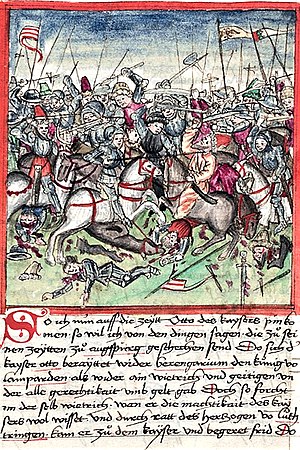
Back معركة ليشفيلد (955) Arabic Бітва на рацэ Лех Byelorussian Битка при Лехфелд Bulgarian Emgann Lechfeld (955) Breton Batalla de Lechfeld Catalan Bitva na Lechu (955) Czech Lechfeldslaget Danish Schlacht auf dem Lechfeld German Batalo de Augsburg Esperanto Batalla de Lechfeld Spanish
| Second Battle of Lechfeld | |||||||
|---|---|---|---|---|---|---|---|
| Part of the Hungarian invasions of Europe | |||||||
 The Battle of Lechfeld, from a 1457 illustration in Sigmund Meisterlin's codex of Nuremberg history | |||||||
| |||||||
| Belligerents | |||||||
|
| |||||||
| Commanders and leaders | |||||||
|
King Otto I Conrad, Duke of Lorraine † Burchard III, Duke of Swabia Boleslaus I, Duke of Bohemia |
horka Bulcsú Lél Súr Taksony of Hungary | ||||||
| Strength | |||||||
|
7,000–9,000 heavy cavalry Garrison |
8,000–10,000 horse archers Infantry Siege engines | ||||||
| Casualties and losses | |||||||
| Heavy | Majority killed | ||||||
The Battle of Lechfeld also known as the Second battle of Lechfeld was a series of military engagements over the course of three days from 10–12 August 955 in which the Kingdom of Germany, led by King Otto I the Great, annihilated the Hungarian army led by Harka Bulcsú and the chieftains Lél and Súr. With the German victory, further invasions by the Magyars into Latin Europe were ended.
The Hungarians invaded the Duchy of Bavaria in late June or early July 955 with 8,000–10,000 horse archers, infantry, and siege engines, intending to draw the main German army, under Otto I, into battle in the open field and destroy it. The Hungarians laid siege to Augsburg on the river Lech. Otto I advanced to relieve the city with an army of 8,000 heavy cavalry, divided into eight legions.
As Otto I approached Augsburg on 10 August, a Hungarian surprise attack destroyed the Duchy of Bohemia rearguard legion. The Hungarian force stopped to plunder the German camp and Conrad, Duke of Lorraine led a counter-attack with heavy cavalry, dispersing the Hungarians. Otto I then brought his army into battle against the main Hungarian army that barred his way to Augsburg. The German heavy cavalry defeated the lightly armed and armored Hungarians in close combat, but the latter retreated in good order. Otto I did not pursue, returning to Augsburg for the night and sending out messengers to order all local German forces to hold the river crossings in Eastern Bavaria and prevent the Hungarians from returning to their homeland. On 11 and 12 August, the Hungarian defeat was transformed into disaster, as heavy rainfall and flooding slowed the retreating Hungarians and allowed German troops to hunt them down and kill them all. The Hungarian leaders were captured, taken to Augsburg and hanged.
The German victory preserved the Kingdom of Germany and halted nomad incursions into Western Europe for good. Otto I was proclaimed emperor and father of the fatherland by his army after the victory and he went on to be crowned Holy Roman Emperor in 962 largely on the basis of his strengthened position after the Battle of Lechfeld.
© MMXXIII Rich X Search. We shall prevail. All rights reserved. Rich X Search